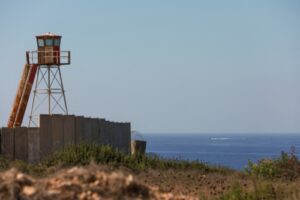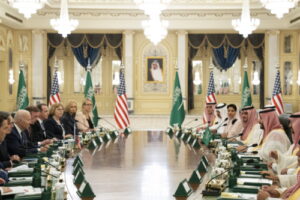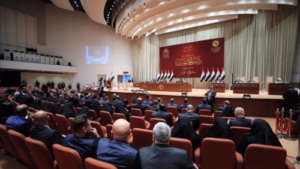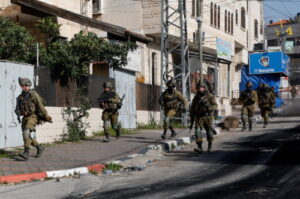
The National Interest Foundation Newsletter
Issue 164, October 13, 2022
Welcome to our NIF Newsletter. In this week’s headlines: Israel and Lebanon reach an agreement on a maritime border deal but challenges remain, OPEC+ with pressure from Saudi Arabia cuts oil production by 2 million barrels a day prompting White House officials to announce that President Biden is open to re-evaluating the United States’ relationship with the Gulf country, Iraq’s parliament meets to elect a new president in an attempt to end months of political deadlock, and observersexpress alarm at increasing violence in the West Bank stemming fromprovocative illegalsettler stormings of theAl-Aqsa Mosque and Israeli military raids.
Israel-Lebanon Maritime Deal and Remaining Challenges

The deal would allow both countries to exploit natural gas fields under the Mediterranean Sea. (Photo from Reuters)
Israel and Lebanon Reach an Agreement on a Maritime Border Deal but Challenges Remain
Israel and Lebanon have reached an agreement regarding their longstanding maritime border dispute over drilling rights and gas production in the Mediterranean Sea. The deal covers an approximately 330-square mile area of contested territory in the region which includes the Karish and Qana gas fields. The agreement came after months of recent United States-mediated talks and has been deemed a significant and positive breakthrough even as some challenges remain moving forward. Analysts and issue experts have pointed out that it is also a noteworthy development as the European Union seeks alternatives to Russian energy in the face of the ongoing war in Ukraine. Additionally, Lebanon has been rife with major economic and financial challenges, and thus desires that profits from gas deposits could provide much-needed relief and alleviate governmental failures to among other things, produce adequate electricity for its citizenry. In the past, international companies had also refused to begin the gas exploration process due to security concerns in the absence of a deal, so the brokered agreement should help quell these apprehensions as well. All told, it is hoped that the maritime deal will pave the way for the non-confrontational development of gas fields in the Mediterranean Sea.
Though the agreement would bring a sense of stability regarding the exploration of contentious energy fields, challenges still remain, as there is much at stake with respect to implementation such as the rights of the undersea natural gas reserves. The reserves in the areas between the Eastern Mediterranean that are claimed by the two countries are at risk of being exploited by a single party. Lebanon and Israel both claim some 860 square kilometers of the Mediterranean Sea. Based on the understood terms of the agreement, the waters would be divided along a line of the strategic Qana natural gas field. Israel has agreed to allow Lebanon to produce gas from their side of the field if Lebanon agrees to pay royalties to Israel for any gas extracted from the Israeli side. The deal itself still requires final stamps of approval in Israel and Lebanon, in addition to a formal signing of the agreement. The United States, a key mediating entity, has expressed that it hopes to see the deal officially signed soon – as both nations have seemingly acknowledged that the deal will suffice their respective needs.
Not everyone is excited about this deal, as former Israeli Prime Minister Benjamin Netanyahu has vowed to cancel it if he is reinstalled as prime minister, with the impending Israeli elections taking place in a couple of weeks on November 1st. Netanyahu has regrettably accused the current government of submitting to Hezbollah threats despite the fact that the group has stated it approves of the deal so long as Lebanese officials do as well. Lebanese President Michel Aoun expressed that the final draft of the agreement is acceptable to Lebanon and hopes that the deal would be formalized as soon as possible. U.S. President Joe Biden also spoke with officials from both countries and congratulated them on the deal, hailing it as a “historic agreement.”
Israel’s cabinet has endorsed the deal, and opened the door for parliamentary review of it. Lawmakers now have approximately 14 days to review details of the deal before it returns to the cabinet for a final vote. In Lebanon, the deal has been green-lighted by the prime minister, president, and parliamentary speaker, with all voicing satisfaction with the terms. It is expected that the potential formalization of the agreement would mean that the resolution of any further maritime differences would go through the United States.
Calls to Re-Evaluate U.S.-Saudi Relationship

U.S. President Biden has expressed that he is open to reassessing ties with Saudi Arabia in the wake of OPEC+’s latest snub. (Photo from AP)
OPEC+ with Pressure from Saudi Arabia Cuts Oil Production by 2 Million Barrels a Day Prompting White House Officials to Announce that President Biden is Open to Re-Evaluating the United States’ Relationship with the Gulf Country
In light of OPEC+’s infuriating decision last week to cut daily oil production by 2 million barrels, President Biden stated his intent to work with Congress to change the nature of U.S. relations with Saudi Arabia. Although the president has not yet reached out to Congress, some members are already on board. Most outspoken among them has been Senator Menendez (D-NJ), who is also the Chairman of the U.S. Senate Foreign Relations Committee, a role that holds significant sway and power in international affairs. In a forceful statement against Saudi Arabia in which he accused them of supporting the sale of Russian oil with the OPEC+ decision, Menendez proclaimed that he would refuse to sign off on the sale of any more U.S. arms to Saudi Arabia until the Gulf country re-evaluates its relationship with Russia. Senator Durbin (D-IL) also spoke strongly in favor of curtailing support to the Saudis, as did Senator Blumenthal (D-CT) and Representative Khanna (D-CA), who are co-authoring a bill that would limit arms sales. A second course of action that Congress is considering is the introduction of legal proceedings against Saudi Arabia for the oil cut decision. For years, an antitrust bill known as NOPEC (No Oil Producing and Exporting Cartels Act) has been floating around the floor, which would enable lawsuits to be levied against them. OPEC+’s decision may galvanize Congress to take the bipartisan bill more seriously. As far as immediate actions go, President Biden decided to pull out of an upcoming meeting for the time being with Saudi Arabia as a part of the U.S. Gulf Cooperation Council Working Group on Iran.
Most of the conversation this week, though, has not been about specific action, but rather about the general state of the relationship between the United States and its long-time ally, Saudi Arabia. Many Democrats and some experts believe that OPEC+’s cut was an “October Surprise” instigated by Saudi Arabia to impact the results of U.S. midterm elections next month. Bruce Riedel, a senior fellow at the Brookings Institute, for example, said that Saudi Arabia is attempting to win re-election for former President Trump and other MAGA Republicans. Khalid Aljabri, an outspoken Saudi political figure close to the government, also expressed his belief that they wanted to hurt Biden and his party at the polls. President Biden’s relationship with Saudi Arabia has been strained from the beginning. On the campaign trail, Biden referred to the kingdom as a “pariah” and vowed to make reforms to the U.S.’s relationship with it. He also ordered that some U.S. missiles being used to aid them be removed from the country. When President Biden seemed to soften his stance in favor of geopolitical considerations and visited Saudi Arabia this past summer, he therefore drew justifiable criticism for the trip from human rights and social justice activists. Biden was also condemned for a now infamous fist bump with Saudi Crown Prince Mohammed bin Salman (MBS), after previously rebuking MBS for orchestrating the heinous 2018 murder of journalist Jamal Khashoggi – a determination that has even been verified by impartial U.S. intelligence officials.
Additionally, with former President Trump, MBS had an extremely close relationship that was criticized for its biased and partial nature. In a break with tradition, President Trump’s first international trip was to the kingdom, where he signed a weapons deal worth $350 billion. The royal family has of course unsurprisingly denied that the OPEC+ decision had anything at all to do with U.S. midterm elections, and while the Saudis seem to have a vested interest in undermining President Biden, there is no assurance that a change to Republican leadership would necessarily be beneficial. At the end of the day, as an array of observers have highlighted, there is valid reason to suspect that one of the underlying motivations behind the OPEC+ decision was to try and impact upcoming U.S. elections.
Furthermore, what is certain is that OPEC+’s decision appears to be almost completely Saudi Arabia’s brainchild, with a little not-so-subtle nudging from Russia. Upon hearing that OPEC+ intended to make a large cut (thought to be 1 million barrels at the time), U.S. officials immediately began contacting Saudi officials to share their concerns that OPEC+’s decision could be viewed as siding with Russia. Additionally, they implored OPEC+ to wait another month before making their decision to see if oil prices adjusted themselves on their own. Naturally, there is speculation – including within the Saudi government – that the attempt to move the OPEC+ vote was an effort to save Democrats in the upcoming midterms, which U.S. officials have refuted. That being said, American voices were far from the only ones raised in protest of OPEC+’s production slash. OPEC+ member states, the United Arab Emirates, Kuwait, Iraq, and Bahrain all opposed the decision, citing the oncoming recession and potential for weaker demand. The UAE was especially vocal, going so far as to send a delegate to Saudi Arabia to deliberate with leaders. In the end, they went along with the decision in order to preserve unity. In the face of pushback, Saudi Arabia has claimed that the cut is an important economic decision for the country’s future, despite the fact that the data may say differently. Before OPEC+ began making cuts this fall, Brent crude was at about $83 a barrel. While it was possible that it may have continued to fall, economists estimate that oil will only need to sell at somewhere between $76-$78 a barrel for Saudi Arabia to balance their budget. Brent crude currently sits north of $92.
Iraq’s Parliament Meets to Elect a New President

Members of the Iraqi parliament met this week to elect a new president. (Photo from Reuters)
Iraq’s Parliament Meets to Elect a New President in an Attempt to End Months of Political Deadlock
This week, members of the Iraqi parliament met in the fourth recent attempt to end a year of political deadlock, this time electing Kurdish politician Abdul Latif Rashid as president, who in turn immediately named Mohammed Shia al-Sudani prime minister-designate. The move to elect a new head of state is aimed at putting an end to political paralysis that has debilitated the country for the past year. Iraqis last voted on October 10th of 2021 in a general election where the populist Shia Muslim leader Muqtada Al-Sadr won the majority of seats. The election was held early due to mass civilian protests against corruption, rampant unemployment, and decaying infrastructure. Despite winning, Al-Sadr was unable to receive the quorum required. Thus, in August, he withdrew his 73 lawmakers in an effort to prevent his political rival, the Coordination Framework, from having the numbers needed to themselves take control of the government. He later announced that he would quit politics, which caused the worst violence Baghdad had seen in years when his loyalists stormed the government palace and clashed with authorities. The violence did not cease until Al-Sadr ordered his loyalists to stop.
The latest parliamentary vote this week took place shortly after an attack which saw nine rockets land around the Iraqi capital green zone. The green zone houses parliament and other government buildings and news stations. The attack injured at least 10 people, and was not the first of its kind as a previous one took place last month as the parliament was holding a vote to confirm its speaker. Many believe these attacks were conducted in an effort to try and obstruct the political process.
The specific and strategic landing of the rockets supports this theory, but as of now, no one has claimed responsibility for the attacks. President Rashid’s election raised concerns about the escalating tensions between the Kurdistan Democratic Party and the Patriotic Union of Kurdistan. These two parties were unable to work out their differences and agree to one candidate as they have in the past. While most were happy about the election, about 20 members of parliament boycotted the vote. Protests once again began and many demand that Iraq stop using the government selection process implemented by the United States after its invasion in 2003.
Since October of last year, Iraq had failed to form a new government after the general election. The United Nations had previously warned that Iraq is running out of time, as the crisis was only breeding further instability. Now having been elected, the president and his prime minister selection will begin arduous negotiations to choose their cabinet. Under a power-sharing system meant to avoid conflict, Iraq’s president is a Kurd, its prime minister a Shi’ite, and its parliament speaker a Sunni. Because it has only had a caretaker government for the past year with no president, parliament has not been able to approve an annual budget, leaving billions of dollars in oil revenue unspent.
Provocative Illegal Settler Stormings and Israeli Military Raids

With the troubling number of military raids and settler stormings, 2022 has been the deadliest year in the West Bank since 2015. (Photo from Reuters)
ObserversExpress Alarm at Increasing Violence in the West Bank Stemming fromProvocative IllegalSettler Stormings of theAl-Aqsa Mosque and Israeli Military Raids
Since March of this year, the Israeli Defense Forces (IDF) have conducted an alarming number of raids in the West Bank which have resulted in the deaths of more than 100 Palestinians, many of them civilians and children. Israel has presented their violent raids as preventative measures against Palestinian extremist attacks known as “Breaking the Wave,” but data shows that a high volume of civilians have been killed as well. Most concerning is the unprecedented 44 Palestinian children that have died in the violence. A 12-year-old boy died on Monday of this week from gunshot wounds received in a raid at the end of last month that killed four other Palestinians and injured 50. The raid was intended to bring to justice the co-conspirators of Raed Khazem, an extremist responsible for a shooting in Tel Aviv in April. IDF troops appeared to simply open fire on a house owned by Khazem’s father and were also “firing in all directions and shooting tear gas cannisters,” as revealed by eyewitnesses. Such action is yet another example of the destructive “collective punishment” that Israel has often utilized to the detriment of Palestinian civilians.
At the forefront of controversy in regard to the raids is the storming of the Al-Aqsa Mosque in East Jerusalem, one of the holiest sites for Muslims. Like the raids on the West Bank, these incursions have also been taking place at a disturbing rate since the spring of this year. Israeli soldiers are regularly called to the compound to either arrest “rioters” or facilitate safe passage to Jews who wish to pray and worship at the site. Back in April, for example, Israeli soldiers violently dispersed crowds at the site because protestors were throwing rocks and other objects towards the Western Wall. 40+ Palestinians were injured by the soldiers’ actions. In late September, soldiers arrived on-site to crack down on a crowd that had gathered to protest the entry of Jews to the mosque.
That the Al-Aqsa Mosque is a space for Palestinians is a long-standing tradition. In fact, most Jews consider it morally wrong to worship at the mosque. Still, ultra-nationalist Israeli leaders have increasingly been encouraging their followers to provocatively conduct their religious practices at the mosque and have even advocated for the demolition of the mosque so it may be replaced by the “Third Temple.” As it is, Israeli forces greatly restrict the number of Palestinians allowed to enter the mosque for “security reasons.” The improper and reprehensible conduct of these far-right groups is largely responsible for the violence that has been taking place at increasing levels.
Moving forward, there is serious concern for escalation of the tense situation both at the Al-Aqsa Mosque and in general across the West Bank. In 2021, a similar conflict at Al-Aqsa was the catalyst for an 11-day Israeli siege of the Gaza Strip. In the West Bank, Israel is illegally building a large apartment complex intended for Israeli citizens in the center of Hebron, a Palestinian city. Protests over its construction were shot down in court. Additionally, tensions are mounting as the November 1st Israeli elections approach. Ultimately, peace activists lament that military raids and illegal settler stormings play a destructive role in only serving to fuel animosity and exacerbate tensions.
